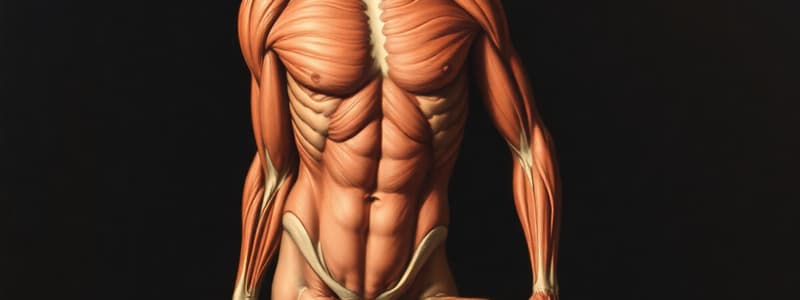Podcast
Questions and Answers
What distinguishes voluntary muscles from involuntary muscles?
What distinguishes voluntary muscles from involuntary muscles?
- Voluntary muscles are found in the heart.
- Involuntary muscles are primarily found in limbs.
- Voluntary muscles are controlled consciously. (correct)
- Involuntary muscles can perform movements at will.
Which muscle type is responsible for movement within internal organs?
Which muscle type is responsible for movement within internal organs?
- Striated muscles
- Skeletal muscles
- Cardiac muscles
- Smooth muscles (correct)
What is the primary characteristic of cardiac muscles?
What is the primary characteristic of cardiac muscles?
- They function voluntarily.
- They are found in the arms and legs.
- They can regenerate quickly after injury.
- They are responsible for pumping blood. (correct)
What commonly causes a muscle strain?
What commonly causes a muscle strain?
What defines a muscle cramp?
What defines a muscle cramp?
Flashcards
Voluntary muscles
Voluntary muscles
Muscles that are under conscious control. You can choose to move them.
Smooth muscles
Smooth muscles
Muscles found in the internal organs, like your stomach and intestines. They operate without conscious control.
Cardiac muscles
Cardiac muscles
Special muscles that make up your heart. They work constantly to pump blood throughout your body.
Muscle strain
Muscle strain
Signup and view all the flashcards
Muscle cramp
Muscle cramp
Signup and view all the flashcards
Study Notes
Muscle Types
- The muscular system is comprised of roughly 600 muscles.
- Voluntary muscles are controlled by conscious effort, like the muscles in your arms and legs.
- Involuntary muscles operate without conscious control, such as the muscles in the stomach and intestines.
- Skeletal muscles are voluntary muscles attached to bones, found in the arms, legs, back, chest, and face.
- Smooth muscles are involuntary muscles found in the internal organs, such as the stomach and intestines. These muscles continuously contract and relax without conscious control.
- Cardiac muscles are found primarily in the heart walls and are involuntary, responsible for pumping blood throughout the body.
Muscle Disorders and Injuries
- Muscle Strain: Occurs when a muscle is stretched beyond its limit, causing a tear. This is also known as a pulled muscle. Common causes include accidents, overuse, or incorrect muscle usage. Muscle strains are painful.
- Muscle Cramp: An involuntary and painful contraction of a muscle that does not easily relax.
- Muscle Bruise: Occurs when a muscle impacts a hard object, causing the muscle tissue to be damaged.
Studying That Suits You
Use AI to generate personalized quizzes and flashcards to suit your learning preferences.




